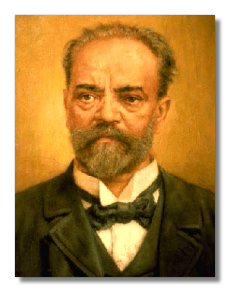Dvorak : Requiem
Saturday, 15 November 2025, 19:30 - 21:30
Southwark Cathedral, London Bridge. London SE1 9DA
 Antonín Dvorák was born on 8 September 1841 about 20 miles north-west of Prague, the first of nine children. Whereas his family had a history of being innkeepers and butchers, the young Dvorák was drawn to music and was soon entertaining the locals at villages dances and in the church. A music teacher in nearby Zlonice recognised an exceptional talent in the young man and began to instruct him in the basics of harmony. Later in life, he became great friends with Johannes Brahms and spent a lot of time in both the United States and, in particular, the UK, which had become one of the most important centres for music excellence in the world in the late 19th century. Antonín Dvorák was born on 8 September 1841 about 20 miles north-west of Prague, the first of nine children. Whereas his family had a history of being innkeepers and butchers, the young Dvorák was drawn to music and was soon entertaining the locals at villages dances and in the church. A music teacher in nearby Zlonice recognised an exceptional talent in the young man and began to instruct him in the basics of harmony. Later in life, he became great friends with Johannes Brahms and spent a lot of time in both the United States and, in particular, the UK, which had become one of the most important centres for music excellence in the world in the late 19th century.
Dvorák’s decision to write a Requiem was not motivated by the death of someone close to him, or by a premonition of his own death; the impulse for the composition was much more prosaic: a commission from the music festival in Birmingham for a work “of first importance”. What was originally a somewhat vague commission assumed a more concrete form when Dvorák’s London-based publisher, Alfred Littleton (Novello), suggested he might like to write a Mass for the Dead.
The world premiere of his Requiem was held on 9 October 1891 during the Birmingham Music Festival with the composer himself on the conductor’s rostrum. The second performance was also in the UK, early the following year in Manchester. The work seemed to exceed all expectations with music critics lauding it as one of the most powerful settings of the Mass for the Dead.
Dvorák divided the liturgical text into two main sections. The first, an image of the Last Judgement, has eight parts of a prevailing sombre tone. The second comprises five parts which bring an atmosphere of solace and conciliation. Unlike the composer’s Stabat Mater (the first piece of music sung by the newly-formed Wimbledon 1914 Choral Society in its debut concert in March 1915), each part of the Requiem is conceived as a through-composed stream of music, without enclosed choral or solo “pieces”.

Source: www.antonin-dvorak.cz/en/
Box office
Ticket sales for this concert are online. A Book Here button will be displayed when sales are open.
|
|